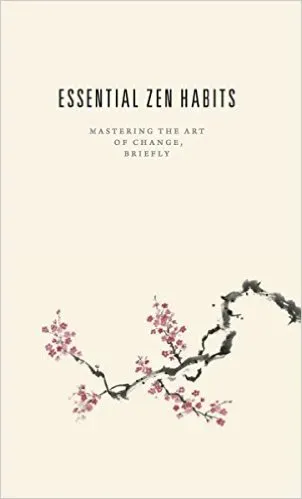Essential Zen Habits – Leo Babauta

Escaping from your childish mind.
Key Insights
- We struggle with habit change because we have unrealistic expectations of how things will turn out, how others should be, and how we should be.
- When our expectations aren’t met, we feel disappointed, frustrated and sad.
- When we turn from our Mind Movie and embrace reality, we overcome our inner resistance to habit change.
Overcoming The Burden Of Making Mistakes
- Have a good intention for the habit, but don’t worry too much about how it will turn out because you can’t control that.
- Tell yourself that when you slip and fall, it’s just another lesson that will teach you to be better at change.
- Mistakes mean you’re pushing into new ground and exploring something interesting — if you weren’t, you wouldn’t make mistakes.
Handling The Urge
Watch an urge gently, without judgement or wishing the feeling wasn’t there. Treat it kindly, like a friend. And see that this feeling is impermanent, just arises but will pass, like a cloud. This is the whole meditation: just watching with curiosity and kindness, not attaching to the feeling or needing to act on it.
You’re strong, you got this. And be realistic in that things won’t go as planned, but those are learning opportunities. In the long run, you’re going to make it because you’re worth it.
How to Create a New Habit
Pick one new, easy habit you can do once a day
- Don’t start right away
- Create a vow
- Create a space
- Set a trigger & a reminder
- Start with a Minimum Viable Habit
- Focus on enjoying the habit
- Practice mindfulness
- Watch your Mind Movie
- Reflect and journal
- A daily practice
- Increase gradually
Understanding How Habits Are Formed
Consider writing a short journal entry about your reflections to solidify your learning.
Treat habit formation as a learning process, as a way to learn about yourself, your mind, mindfulness, resistance, and more.
Gradually, the habit becomes your new normal, and you can expand a bit more, pushing your comfort zone a little at a time.
How to Quit a Bad Habit
- Don’t attempt a quit until several successful new habit changes
- Track your habit
- List your triggers
- List your needs
- Come up with replacement habits
- Use techniques you’ve learned
- Gradual change vs. cold turkey
- Learn to recognize urges as they arise
- Form the right mindset
- When you fail, get back on track and don’t let it derail you
What does Resistance feel like?
Question: “What does the resistance feel like?” Is there a way to accept the thing you’re resisting, accept the discomfort, relax into it, and find gratitude for it? “What is good about the discomfort?”
A key habit skill is learning to flow around disruptions and just keep going.
Observe feelings of discomfort and uncertainty and stay with them. Get to know them. Get intimate with these feelings.
When we experience “groundlessness”—a feeling of not being anchored, not being certain, things not going our way, a feeling of loss—our minds don’t normally like it.
Positive Habits Vs Bad Habits
Form new, positive habits at least three times before quitting.
The first thing you need to do before you attempt to quit a habit is to track it for three days and try to write down every trigger for the habit.
Each bad habit meets some kind of need, or you wouldn’t be doing the habit.
For each trigger and need, write down a positive replacement habit that will meet the same need.
The Movie Inside Our Minds
There’s a projector in our minds, and it’s constantly playing a movie about how we’d like things to be, our ideals about the world, our expectations of how things will turn out, and how people should be.
The Mind Movie is what stands in our way of making habit changes. To alter this, we must wander outside our comfort zone.
The Childish Mind
The childish mind is the part of our mind that complains about how things are, that fears discomfort, that just wants pleasure and comfort, and that doesn’t want things to be difficult.
Gratitude is a great antidote to resistance that we can practice each day, even when our childish mind eventually starts to rebel against the habit.
Take mistakes in stride and take the long view: what really matters is not whether you mess up for a day or two but what you do over weeks, months, and years.
The real question isn’t whether you’ll mess up, but what you’ll do if you do mess up.

